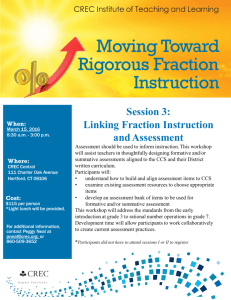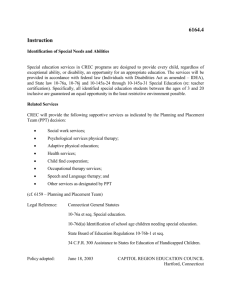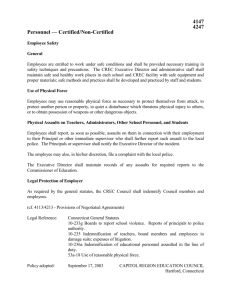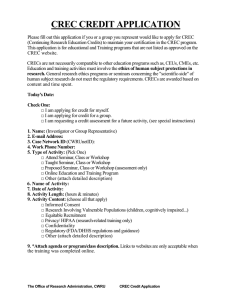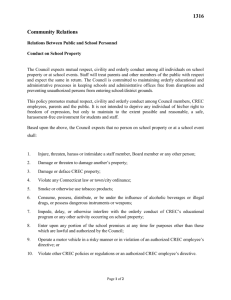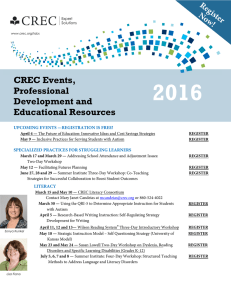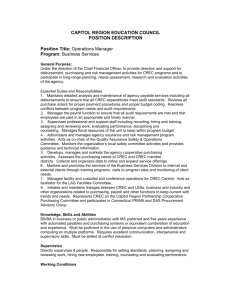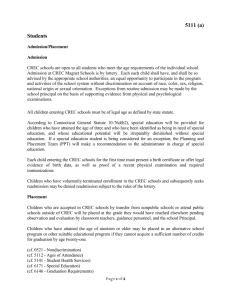Guiding Principles for Student Success
advertisement
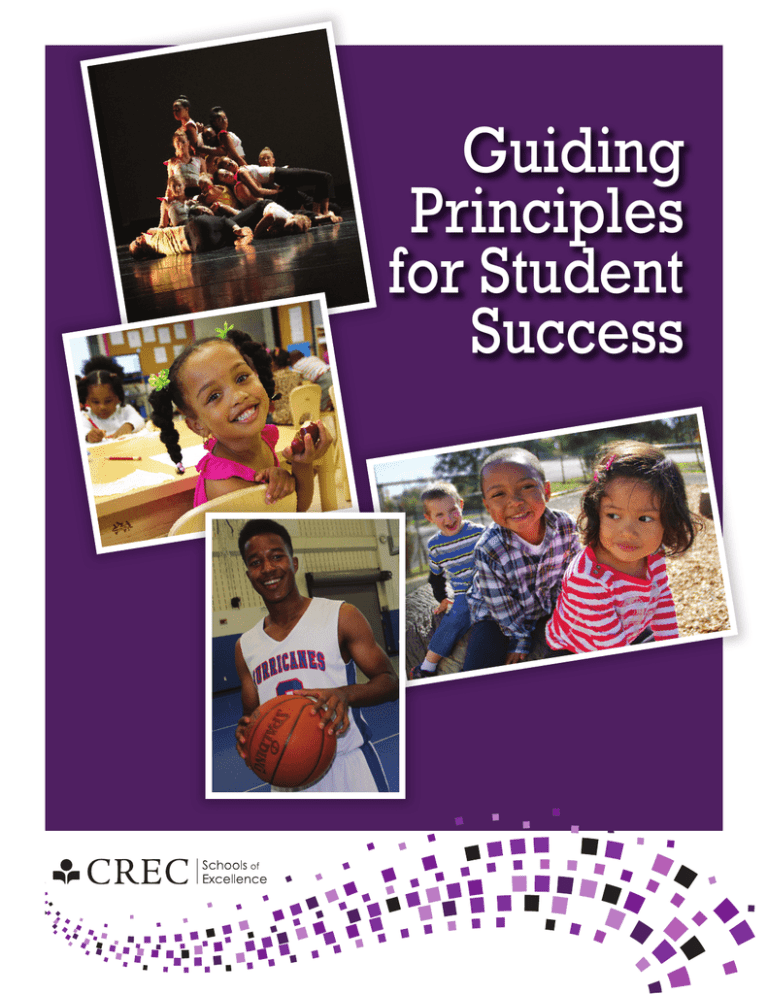
Guiding Principles for Student Success CREC magnet schools have adopted a set of guiding principles to inspire high intellectual performance and to ensure each student’s success. These principles set forth the following goals: inspiring high intellectual performance; graduating students college and career ready; enlisting parents as co-educators; and engaging the mind, body, and heart of every student. Each student’s emotional, physical, and intellectual well-being is taken into account when they enter a CREC magnet school. To that end, the appropriate steps are taken to ensure their achievement. Inspire High Intellectual Performance Enlist Parents as Co-Educators Communication & Collaboration Mobilize a Culture Committed to Excellence Self-Direction & Resourcefulness Student Success Critical Thinking & Problem Solving Graduate 100% of Students College Ready Creativity & Innovation Engage the Mind, Body & Heart Defining Student Success CREC educators adhere to guiding principles to ensure student success. In order for students to be successful and deemed college ready, they must demonstrate proficiency with essential knowledge and skills in core content areas and develop the thinking and learning skills to be academically, socially and emotionally prepared for lifelong learning and global citizenship. Essential Content Knowledge Self-Direction & Resourcefulness Communication & Collaboration Students will meet performance standards in the following core content areas: •English Language Arts •Mathematics •World Languages •Arts •Health and Fitness •Science and Engineering •Social Studies •Technology Literacy Student Success Creativity & Innovation Critical Thinking & Problem Solving Students will demonstrate awareness of the following interdisciplinary themes as these are woven into the core content areas: •Global Awareness •Financial, Economic, Business and Entrepreneurial Literacy •Civic Literacy •Environmental Literacy •Theme Specific Knowledge •Appropriate Use of Technology Students will demonstrate proficiency in research and information fluency* in core content areas by: •Applying digital tools to gather, evaluate, and use information. •Planning strategies to guide inquiry. •Locating, organizing, analyzing, evaluating, synthesizing, and ethically using information from a variety of sources and media. •Evaluating and selecting information sources and digital tools based on the appropriateness to specific tasks. •Processing data and reporting results. * ISTE Standard, 2014 Essential Skills Students must be challenged to engage in opportunities to develop and demonstrate proficiency in the following essential skills: Critical Thinking and Problem Solving All students will demonstrate proficiency in critical thinking and problem solving and meet rigorous content standards by: •Collecting, assessing, and analyzing relevant information. •Reasoning effectively. •Using systems thinking. •Making sound judgments and decisions. •Identifying, defining and solving authentic problems and essential questions. •Reflecting critically on learning experiences, processes and solutions. •Conducting research and managing projects using appropriate digital tools and technology. •Understanding and using appropriate technology systems effectively and productively. •Practicing safe, legal, and responsible use of information and technology. Communication and Collaboration All students will demonstrate proficiency in communication and collaboration and meet rigorous content standards by: •Using effective interpersonal skills during conversations and discussions to build positive relationships with others and promote collaborative learning. •Communicating interactively and effectively to support individual learning and contribute to the learning of others using a range of contemporary tools, and digital media. •Listening effectively to decipher meaning, including knowledge, values, attitudes and intentions. Communicating ideas through the creation of authentic products using a combination of words, data, and visual representations to inform, persuade and entertain others. •Communicating effectively in diverse environments (including multi-lingual), using a variety of media and formats. •Demonstrating cultural understanding and global awareness when engaging with learners of other cultures. •Delivering effective oral presentations to communicate the results of inquiry. Fielding questions to demonstrate conceptual understanding and knowledge, along with details about the inquiry process. •Collaborating with others. •Demonstrating the ability to work effectively and respectfully with diverse teams. •Exercising flexibility and willingness to be helpful in making necessary compromises to accomplish a common goal. •Assuming shared responsibility for collaborative work, and valuing the individual contributions made by each team member. •Working productively in teams for sustained periods of time to develop high-quality products. Creativity and Innovation All students will demonstrate proficiency in creativity and innovation and meet rigorous content standards by: Thinking Creatively •Using a wide range of idea creation techniques (such as brainstorming). •Creating new and worthwhile ideas (both incremental and radical concepts). •Elaborating, refining, analyzing and evaluating their own ideas in order to improve and maximize creative efforts. Working Creatively with Others •Developing, implementing and communicating new ideas to others effectively. •Being open and responsive to new and diverse perspectives; incorporating group input and feedback into the work. •Demonstrating originality and inventiveness in work and understanding the real world limits to adopting new ideas. Demonstrating Courage to Explore •Viewing failure as an opportunity to learn: Understanding that creativity and innovation is a long-term, cyclical process of small successes and frequent mistakes. Implementing innovations •Acting on creative ideas to make a tangible and useful contribution to the field in which the innovation will occur. •Developing innovative products and processes using technology. Self-Direction and Resourcefulness All students will demonstrate proficiency in self-direction and resourcefulness and meet rigorous content standards by: Managing Goals and Time •Setting goals with tangible and intangible success criteria. •Balancing tactical (short-term) and strategic (long-term) goals. •Utilizing time and managing workload efficiently. •Multi-tasking when appropriate, e.g. performing work on more than one project or activity simultaneously. Work Independently •Monitoring, defining, prioritizing and completing tasks without direct oversight. Being Self-directed Learners •Going beyond basic mastery of skills and/or curriculum to explore and expand one’s own learning and opportunities to gain expertise. •Demonstrating initiative to advance skill levels. •Demonstrating commitment to learning as a lifelong process. •Reflecting critically on past experiences in order to inform future progress. •Taking chances and/or risks in an effort to expand knowledge or practice skills in new and unfamiliar contexts. Demonstrating a Positive Attitude •Cooperating with coworkers and supervisors. •Taking direction willingly. •Exhibiting eagerness to learn. •Acting in a pleasant and polite manner. Essential Habits, Beliefs and Character Strengths Students will demonstrate the following to pursue goals and achieve success despite obstacles or discomfort: •Grit •Respect •Diversity •Fairness •Honesty •Risk-taking •Persistence •Flexibility •Emotional/Social Intelligence •Reliability •Stress management •Decision making Inspire High Intellectual Performance Guiding Principles for CREC Educators In CREC’s Magnet Schools it is a belief that all students can learn at high levels and that they will graduate from CREC Schools college ready and able to meet the demands of a global society. Supporting this mission requires educators to be committed to the following guiding principles and continually focus on student success. Graduate 100% of Students College Ready Enlist Parents as Co-Educators Inspire High Intellectual Performance CREC educators will: Student Success •Ensure content is cognitively complex, thoughtprovoking, challenging and conceptual. •Cultivate skills that foster independent, self-directed and productive learners who are creative and critical Mobilize Engage the thinkers, problem-solvers, and innovators. a Culture Mind, Body •Enhance student engagement through effective Committed to curriculum design, pedagogy, and assessment & Heart Excellence strategies. •Create learning experiences that incorporate digital tools and resources to engage students in exploring real-world issues and solving authentic problems. •Provide supports and extensions so all students have equal opportunity for success. •Encourage students to make connections between their academic success and their plans after graduation. •Monitor student progress towards meeting and exceeding defined standards and goals. Graduate 100% of Students College Ready CREC educators will: •Create an environment that points to a four year college for all students. •Develop partnerships with industry and community to provide students with meaningful experiences related to potential career interests. •Provide students with support and assistance in establishing goals for academic, career, social, emotional, and physical development that meet rigorous high school and postsecondary expectations. •Provide individualized opportunities for students with disabilities to become as independent as possible and to become self-advocates. •Set lofty goals for each graduation class and track the results over time. Engage the Mind, Body, and Heart CREC educators will: •Demonstrate and foster respect for student and staff diversity in informal interactions, formal lessons, and curriculum content. •Strive to build personal relationships with students acknowledging their unique strengths, talents, and interests. •Ensure that all schools have time and opportunity for all students to engage in meaningful conversations with adults about their feelings, aspirations, fears, etc. •Promote and model digital etiquette and responsible social interactions related to the use of technology and information. •Provide opportunities for students to find their voice in an activity which takes place beyond the classroom, giving them the opportunity to feel good about their abilities and potential. •Provide opportunities for students to engage with their peers in meaningful activities beyond academics that provide them with leadership skills and foster independence. •Implement school themes with high quality to engage learners in meaningful ways and help them to become lifelong learners. •Provide learning experiences that develop culturally capable students who make a difference as socially and ethically responsible citizens. •Cultivate a safe and healthy community that promotes positive, lifelong wellness practices, including adequate exercise, proper nutrition, and abstaining from harmful habits. Mobilize a Culture Committed to Excellence CREC educators will: •Define and measure what excellence means for the school in terms that extend beyond test score results. •Develop a climate of trust in the school that allows staff to give and receive constructive feedback. •Seek feedback from students, peers and supervisors and engage in a cycle of continuous improvement by identifying strengths and weaknesses and responding accordingly. •Identify areas of expertise that can be the signature of a school. •Improve practice through self-directed professional learning and critical reflection informed by a range of evaluation approaches. •Empower staff and students to create programs and opportunities that allow CREC students to effectively compete with those in other schools and districts. Enlist Parents as Co-Educators CREC educators will: •Provide opportunities for parents to be integrally involved in their child’s education in a manner that is respectful of family style, culture, and need. •Create an environment where parents feel welcome and a part of the school community. •Communicate student performance to families on a regular basis, through a means that they can understand. •Facilitate and encourage frequent, meaningful two-way communication •Understand the diversity of student backgrounds and respect that diversity by ensuring that it is reflected in the curriculum. •Seek to understand and counter the power relationships that exist or are perceived to exist around race, class, gender, etc. •Embrace parents as co-educators. CREC develops and runs some of the most innovative and successful public magnet schools in the state. Through these guiding principles and adherence to these definitions for student success, we will move towards closing the achievement gap and preparing our students from diverse backgrounds for college and for the challenges of global citizenship.
